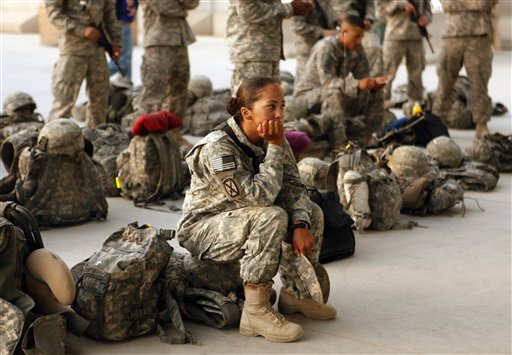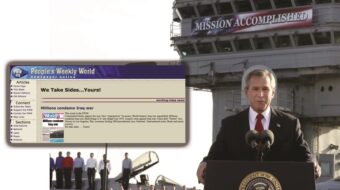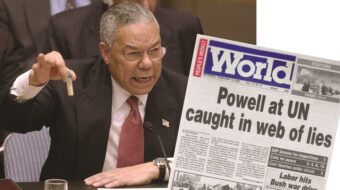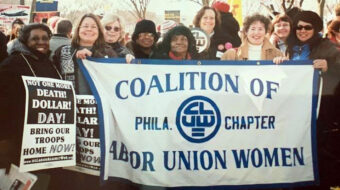
The United States has begun withdrawing troops from Iraq ahead of a major August pullout. A contingent left July 13, cutting short their normal 12-month tour of duty.
The August withdrawal is billed as ending the U.S. combat mission in Iraq, fulfilling a vow President Obama made shortly after taking office last year. Yet some 50,000 “noncombat” troops will remain, along with thousands of private contractors and other U.S. personnel. It remains to be seen what the impact will be on Iraq, and whether all U.S. troops will really leave by 2011 as specified in the agreement signed by President George W. Bush and Iraqi Prime Minister Nouri al-Maliki in the Bush administration’s final days.
The number of U.S. troops in Iraq is already down to around 75,000 from a peak of about 170,000 during the 2007 “surge.”
Under the status of forces agreement signed in December 2008, the U.S. agreed to pull out of Iraqi towns and cities by June 30, 2009, and remove all troops by Dec. 31, 2011.
U.S. troops did withdraw from Iraqi cities last June, moving to massive bases nearby. However they continued to conduct joint operations with the Iraqi army, officially at the Iraqis’ request.
Violence continues, with suicide bombings in Baghdad on Sunday killing at least 43 Sunni “Awakening Council” members waiting to collect their government paychecks. Yet attacks are down overall, according to a variety of sources.
U.S. officials are taking pains to insist that next month’s withdrawal will proceed as planned. The U.S. pullout “will not in any way affect the physical stability of Iraq,” Vice President Joe Biden told ABC News shortly after the Sunday bombings.
Earlier this month, the top U.S. commander in Iraq, Gen. Ray Odierno, suggested that UN peacekeeping forces could be brought in to northern Iraq when U.S. forces leave, to help the Iraqi government curb violence in Mosul and other areas disputed between Kurds and Arabs.
Odierno said a UN force would benefit both the Iraqis and the U.S., enabling President Obama to stick to his withdrawal timetable.
Brig. Gen. Kenneth Tovo, who heads U.S. operations in Anbar province, told the Christian Science Monitor he and his Iraqi counterparts believe that “political opportunism” is behind most of the current violence “in this uncertain period when we are working on national government formation.” Tovo reflected a wide Iraqi view that when the new Iraqi government is formed, “a lot of this will settle down.”
The attacks, which are being credited to “al-Qaeda in Iraq,” come in the context of a four-month political leadership stalemate following Iraq’s March 7 national elections. The elections did not produce a clear winner, with Maliki’s State of Law slate coming in 2 votes behind a slate headed by former Prime Minister Iyad Allawi. Neither garnered enough votes to form a government on their own. Both presented themselves as non-sectarian, but Maliki’s party is Shiite Islamist while Allawi’s slate is linked to former Baathists. The outcome was skewed by a controversial election law which essentially disenfranchised smaller parties, including Iraq’s well-respected Communist Party and other democratic and ethnic minority parties, and handed their votes to the dominant slates.
Since March, the big political blocs have been engaged in non-stop deal-making, each trying to line up support to head the new government. Neighboring countries, especially Iran, Syria and Saudi Arabia, are involved, each seeking a post-occupation Iraqi government that is friendly to the economic and political interests of their respective ruling circles.
And the U.S. is looking for a friendly and stable Iraqi government that will quell the remaining violence, enable the U.S. to free its strained military for Afghanistan and other ventures, and put out a welcome mat for U.S. corporations.
Of course, certain right-wing U.S. circles want to keep a military presence there. And Iraqi commentators say some Iraqis, including some former Baathists but others as well, want the U.S. to stay, feeling the Americans will help them gain leverage over their opponents.
Before the March elections, some saw the U.S. as favoring the Allawi slate. Certainly, Allawi’s campaign benefited from vast sums of money from Saudi Arabia, a key U.S. ally.
Biden went to Iraq July 3, his fifth trip there since taking office as vice president 18 months ago, to press for a speedy resolution to the governmental crisis. Reportedly he pushed for an alliance between the Allawi and Maliki slates. But according to the Iraqi political analysis site Niqash, “Biden’s visit raised fears among the other major political parties that they will be excluded from the government.” Since then, the wheeling and dealing has continued.
Iraqis say the much talked-of Sunni-Shiite divide was largely manufactured and then exacerbated by the U.S. occupation. Saddam Hussein’s Sunni-based regime also included Shiites. Allawi, a former Baathist now heading a Sunni-based slate, is a Shiite. Maliki’s Shiite slate also includes Sunnis. Communists and other progressive parties include Sunnis as well as Shiites.
But Shiites, persecuted under Saddam Hussein, and generally associated with Iraq’s working class and poor, make up 60 percent of the population. Together with the Kurds, who are 20 percent, and some smaller ethnic minorities, they have no intention of allowing Allawi and his Sunni-Baathist-linked slate to take the prime ministership.
Photo: U.S. Army Sgt. Alma Santiago, 25, from Worcester, Mass., with 2nd Brigade, 10th Mountain Division, waits at Baghdad International Airport as her unit begins their journey to the United States, July 13. The soldiers, based at Fort Drum, N.Y., are headed home after nine months in Iraq as part of the U.S. drawdown of forces, which begins in earnest next month. (AP/Maya Alleruzzo)

MOST POPULAR TODAY


Zionist organizations leading campaign to stop ceasefire resolutions in D.C. area

Communist Karol Cariola elected president of Chile’s legislature

Afghanistan’s socialist years: The promising future killed off by U.S. imperialism

High Court essentially bans demonstrations, freedom of assembly in Deep South






Comments